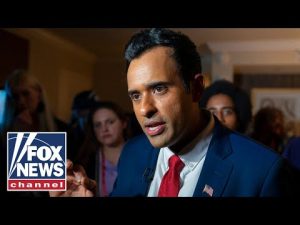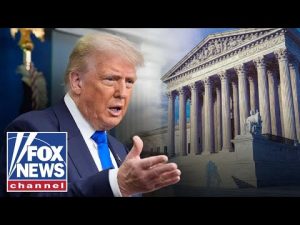In a recent discussion about the power of tariffs in foreign policy, two legal experts joined to dissect how tariffs can affect American manufacturers and international trade. The conversation centered around a significant case that’s making its way through the Supreme Court, where former President Trump’s use of tariffs is under scrutiny. It raises questions about whether the president has overstepped his bounds or if he was operating within the authorities provided to him by Congress.
The debate between the legal experts revealed an intriguing history of tariff authority in the United States. Tariffs, those taxes imposed on imported goods, have a long and sometimes rocky legislative history. The Smoot-Hawley Tariff Act, enacted during the Great Depression, is often cited as a key example of how poorly timed tariffs can spark trade wars and further economic troubles. After that, Congress opted to grant some authority to presidents for tariffs, creating gray areas that today’s justices are now grappling with. The crux of the issue stems from whether the powers granted to the president were clear enough to allow him to enact tariffs as a form of foreign policy.
As discussions progressed, the experts offered predictions about how the Supreme Court might rule. There’s a strong belief that the court will lean towards a strict interpretation of constitutional powers. With justices like Amy Coney Barrett, known for her originalist views, it seems likely that the court might find against the former president. If this happens, the ruling could complicate tariff structures that have already collected billions from American businesses and consumers alike. The burning question, however, is what would happen to all that money collected if the tariffs were deemed unlawful? It could open a Pandora’s box filled with legal headaches and economic chaos.
Alongside the tariff debate, the experts touched upon another ongoing controversy involving the Department of Justice. They discussed the ongoing investigation into former FBI Director James Comey, particularly focusing on his handling of documents related to the infamous Russia collusion investigation. Evidence has come to light suggesting that Comey had prior knowledge of certain unfolding events, contradicting his earlier statements to Congress. The implications of these revelations could signal a dark moment for those involved in what many refer to as the “Obamagate” scandal.
As news continues to emerge around these cases, impatience seems to be a common sentiment. Many are eager for resolutions to investigations that seem to drag on longer than expected. The panelists noted the frustration of those who have been waiting for indictments, suggesting that the wheels of justice sometimes turn far too slowly for public consumption. However, the unfolding revelations, such as Comey’s emails and notes that reportedly were hidden away, might just be the tip of the iceberg.
In summary, the discussions surrounding tariff authority and the ongoing investigations into government officials reveal a nation wrestling with its principles and practices. As the Supreme Court prepares to make what could be monumental rulings regarding presidential powers, and as more evidence comes to light regarding the actions of past administrations, Americans will be watching closely. They may find that the balance of power and accountability in government is a topic worth pondering long after the dust settles.







